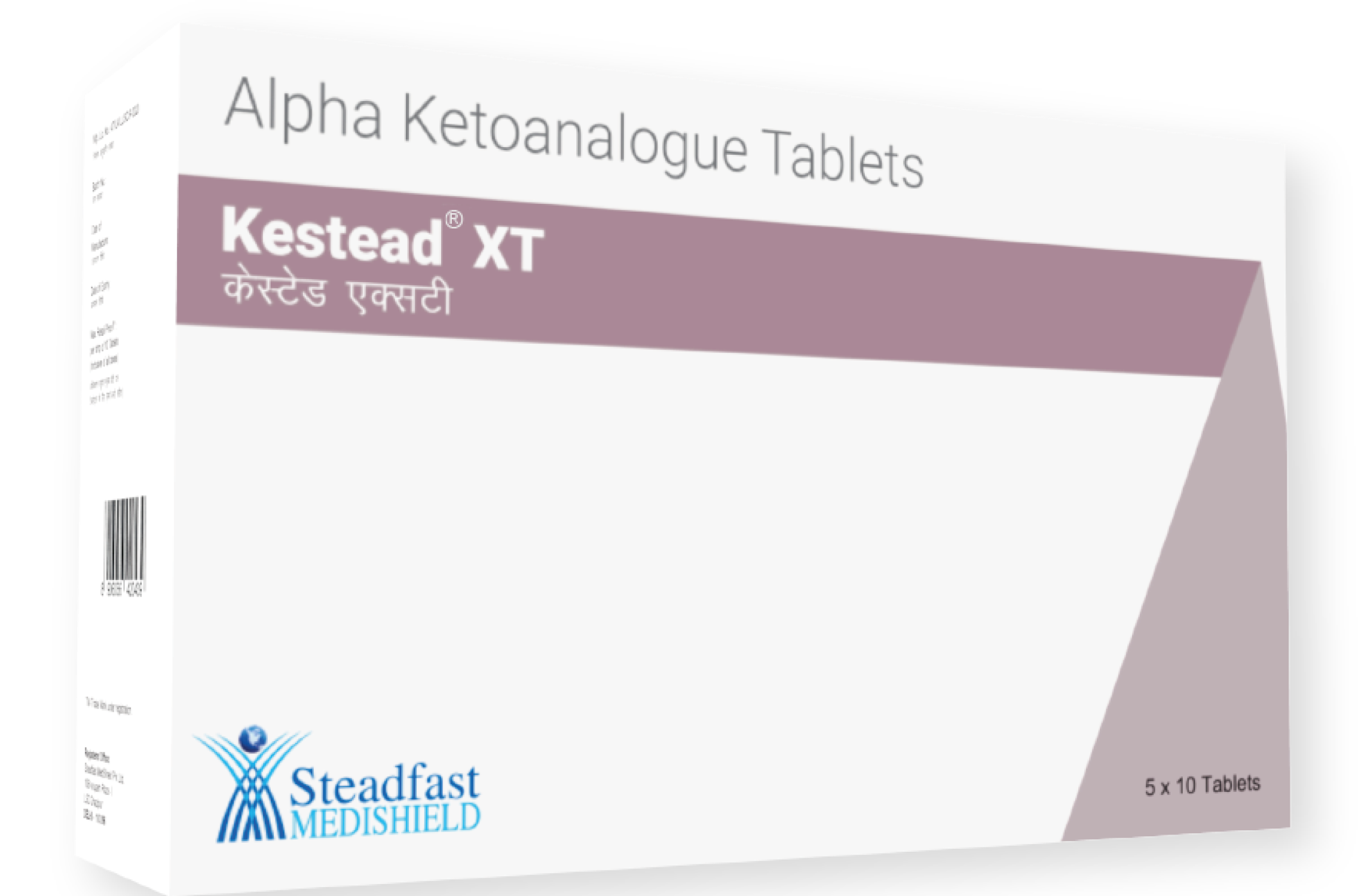
Description:
Kestead XT is part of the conservative treatment of patients with Chronic Kidney Disease. Kestead XT contains amino acids, partly in form of their corresponding-Ketoanalogues, essential for patients with Chronic Kidney Disease. In combination with a protein-restricted diet Kestead XT is an excellent tool to treat Chronic Kidney Disease in the pre-dialysis period with high pill burden.
It offers double strength of Alpha Ketoanalogues ensures the intake of essential amino acids and prevents deleterious consequences of inadequate dietary protein intake by reducing pill burden hence increasing patient compliance and convenience.
Benefits
• Reduction of uremic symptoms, which are largely due to an accumulation of degradation products of the protein metabolism
• Preservation of the residual renal function and therefore slowing down the rate of progression of the chronic kidney disease and delaying the onset of dialysis
• Preservation of the nutritional status, despite the marked reduction of the daily protein intake
• Improvement of metabolic complications due to renal insufficiency (e.g. proteinuria, disturbances in calcium-phosphate, carbohydrate and lipid metabolism)
Composition
One film coated tablet contains:
• Calcium-3-methyl-2-oxovalerate (α-Ketoanalogue to isoleucine, Calcium salt) 134 mg
• Calcium-4-methyl-2-oxovalerate (α-Ketoanalogue to leucine, Calcium-salt) 202 mg
• Calcium-2-oxo-3-phenylpropionate (α-Ketoanalogue to phenylalanine, Calcium-salt) 136 mg
• Calcium-3-methyl-2-oxobutyrate (α-Ketoanalogue of valine, Calcium-salt) 172 mg
• Calcium-DL-2-hydroxy-4-(methylthio)-butyrate α-hydroxyanalogue to methionine, Calcium salt) 118 mg
• L-lysine Acetate U.S.P (Eq. To L Lysine 150 mg) 210 mg
• L-threonine U.S.P 106 mg
• L-tryptophan U.S.P 46 U.S.P mg
• L-histidine U.S.P 76 mg
• L-tyrosine U.S.P 60 mg
Indications
Prevention & therapy of damages due to CKD till GFR is 15 ml/min, i.e. stages II, III & IV of CKD
Mechanism of Action
On absorption alpha Ketoanalogue get converted to their respective amines by taking up the Nitrogen from non essential amino acids, thus reducing the nitrogenous waste load on the kidneys and fulfilling the nutritional requirement.
Contraindications
Hypercalcaemia, disturbed amino acid metabolism. In case of hereditary phenylketonurie it has to be taken into account that this product contains phenylalanine.
Precautions and Warnings
No experience has been made so far with the application in pregnancy and pediatrics. Kestead XT should be taken along with meals to allow proper absorption and metabolism into the corresponding amino acids. The serum calcium level should be monitored regularly. An adequate supply of calories should be ensured.
Undesirable effects
Hypercalcemia may develop. In this case, it is recommended to decrease vitamin D intake. If the hypercalcaemia persists, reduce the dosage of Kestead XT as well as any other source of calcium.
Drug Interactions
Simultaneous administration of medicinal products that contain calcium (e.g. acetolyte) may trigger, or worsen, a pathological increase in the serum calcium level.
As the uraemic symptoms improve under therapy with Kestead XT tablets, the dose of aluminium hydroxide administered should be reduced, as appropriate. The patient should be monitored for reduced levels of serum phosphate.
In order not to interfere with absorption, an appropriate interval should be observed between administration of Kestead XT tablets and medicinal products which form poorly soluble compounds with calcium (e.g. tetracyclines, quinolones such as ciprofloxacin and norfloxacin, preparations that contain iron, fluoride and estramustin). An interval of at least 2 hours should be observed between the intake of Kestead XT tablets and such preparations. If administration of Kestead XT tablets leads to increased blood levels of calcium, the sensitivity to medicinal products which increase heart action (cardiac glycosides) and thus also the risk of cardiac arrhythmia is increased.
Dosage Form
Oral Tablet
Dosage and Administration
1 Tablet/10 kg body weight/day along with meal, divided in 3 equal dosage
Storage
Do not use Kestead XT after expiry date
Keep out of the reach of children
Do not store above 25°C
Protect from moisture
Presentation
10 tablets packed in a strip, 5 such strips packed in a carton
Product Information
If you require any information please visit our website (www.steadfast.co.in) & For Immediate stock availability please contact our representative
References:
Aparacio M., Chauveau P., de Prècigout V., Bouchet J.L., Lasseur C., Combe C.
Nutrition and outcome on renal replacement therapy of patients with chronic renal failure treated by a supplemented very low protein diet
J. Am. Soc. Nephrol. 2000; 12: 708-716
Barsotti G., Cupisti A., Barsotti M., Sposini S., Palmieri D., Meola M., Lenti C., Morelli E.
Dietary treatment of diabetic nephropathy with chronic renal failure
Nephrol. Dial. Transplant 1998; 13 (Suppl. 8): 49-52
Barsotti G., Cupisti A., Morelli E., Meola M., Cozza V., Barsotti M., Giovanetti S.
Secondary hyperparathyroidism in severe chronic renal failure is corrected by very-low dietary phosphate intake and calcium supplementation and calcium carbonate supplementation
Nephron. 1998; 79: 137-141
Bernhard J., Beaufrere B., Laville M., Fougue D.
Adaptive response to a low-protein diet in predialysis chronic renal failure patients.
J. Am. Soc. Nephrol. 2001; 12: 1249-1254
Combe C., Aparicio M.
Phosphorus and protein restriction and parathyroid function in chronic renal failure.
Kidney Int. 1994; 46: 1381-1386
Coresh J., Walser M., Hill S.
Survival on dialysis among chronic renal failure patients treated with a supplemented low-protein diet before dialysis
J. Am. Soc. Nephrol. 1995; 6: 1379-1385
Cupisti A., Licita R., Chisari C., Stampacchia G., D’Alessandro C., Galetta F., Rossi B., Barsotti G.
Skeletal muscle and nutritional assessment in chronic renal failure patients on a protein-restricted diet.
J. Int. Med. 2004; 255: 115-124
Di Iorio B.R., Minutolo R., De Bicola L., Bellizzi V., Catalano F., Iodice C., Rubino R.,
Cont G.
Supplemented very low protein diet ameliorates responsiveness to erythropoietin in chronic renal failure.
Kidney Int. 2003; 64: 1822-182
Feiten S.F., Draibe S.A., Watanabe R., Duenhas M.R., Baxmann A.C., Nerbass F.B., Cuppari L.
Short-term effects of a very low protein diet supplemented with ketoacids in non-dialyzed chronic kidney patients
Eur. J. Clin. Nutr. 2005 ; 59:129-136
Fouque D., Wang P., Laville M., Boissel J.P.
Low protein diets for chronic renal failure in non diabetic adults.
The Cochrane Library 2003, Volume 1
Gin H., Aparicio M., Potaux L., Merville P., Combe C., de Precigout V., Bouchet J.L., Aubertin J.
Low-protein, low-phosphorus diet and tissue insulin sensitivity in insulin dependent diabetic patients with chronic renal failure.
Nephron. 1991; 57: 411-415
Hansen H.P.; Tauber-Lassen E., Jensen B.R.; Parving H.H
Effect of dietary protein restriction on prognosis in patients with diabetic nephropathy
Kidney Int. 2002; 62: 220-228
Lafage M.H., Combe C., Fournier A., Aparicio M.
Ketodiet, physiological calcium intake and native vitamin D improve renal osteodystrophy
Kidney Int. 1992; 42: 1217-1225
Masud T., Young V.R., Chapman T., Maroni B.
Adaptive responses to very low protein diets: the first comparison of ketoacids to essential amino acids
Kidney Int. 1994; 45: 1182-1192
Mir S., Özkayin N., Akgun A.
The role of keto acids in the supportive treatment of children with chronic renal failure
Pediatr. Nephrol. 2005; 20: 950-955
Mitch W.E.
Beneficial responses to modified diets in treating patiens with chronic kidney disease
Kidney Int. 2005; 67 S94: 133-135
Pedrini M.T., Levey A.S., Lau J.L., Chalmers T.C., Wang P.H.
The effect of dietary protein restriction on the progression of diabetic and nondiabetic renal diseases: a meta analysis
Ann. Intern. Med. 1996; 124: 627-632
Prakash S., Pande D.P., Sharma S., Sharma D., Bal C.S., Kulkarni H.
Randomized, Double-Blind, Placebo-Controlled Trial to Evaluate Efficacy of Ketodiet in Predialytic Chronic Renal Failure.
J. Renal Nutr. 2004; 14: 89-96
Rigalleau V., Blanchetier V., Combe C., Guillot C., Deleris G., Aubertin J., Aparicio M., Gin H.
A low-protein diet improves insulin sensitivity of endogenous glucose production predialytic uremic patients.
Am. J. Clin. Nutr. 1997; 65: 1512-1516
Teplan B., Schuck O., Horauova M., Skibova J.
Effect of a keto acid – amino acid supplement on the metabolism an renal elimination of branched-chain amino acids in patients with chronic renal insufficiency on low protein diet
Wien. Klin. Wochenschr. 2000;112: 876-881
Teplan V., Schuck O., Knotek A., Hajny J., Horackova M., Kvapil M.
Enhanced metabolic effect of erythropoietin and keto acids in CRF patients on low-protein diet: Czech multicenter study.
Am. J. Kidney Dis. 2003, 41 (Suppl 1): 26-30
Teplan V., Schuck O., Knotek A., Hajny J., Horackova M., Skibova J., Maly J.
Effects of low-protein diet supplemented with ketoacids and erythropoietin in chronic renal failure: a long-term metabolic study.
Annals of Transplantation 2001; 6: 47-53
Teschan P.E., Beck G.J., Dwyer J.T., Greene T., Klahr S., Levey A.S., Mitch W.E., Snetselaar L.G., Steinman T.O., Walser M.
Effect of a ketoacid-aminoacid-supplemented very low protein diet on the progression of advanced renal disease: a reanalysis of the MDRD feasibility study
Clin. Nephrol. 1998; 50: 273-283
Tom K., Young V.R., Chapman T., Masud T., Akpele L., Maroni B.J.
Long-term adaptive responses to dietary protein restriction in chronic renal failure.
Am. J. Physiol. 1995; 4: 668-677
Vendrely B., Chauveau P., Barthe N., El Haggan W., Cataing F., de Precigout V.,
Combe C., Aparicio M.
Nutrition in hemodialysis patients previously on a supplemented very low protein diet.
